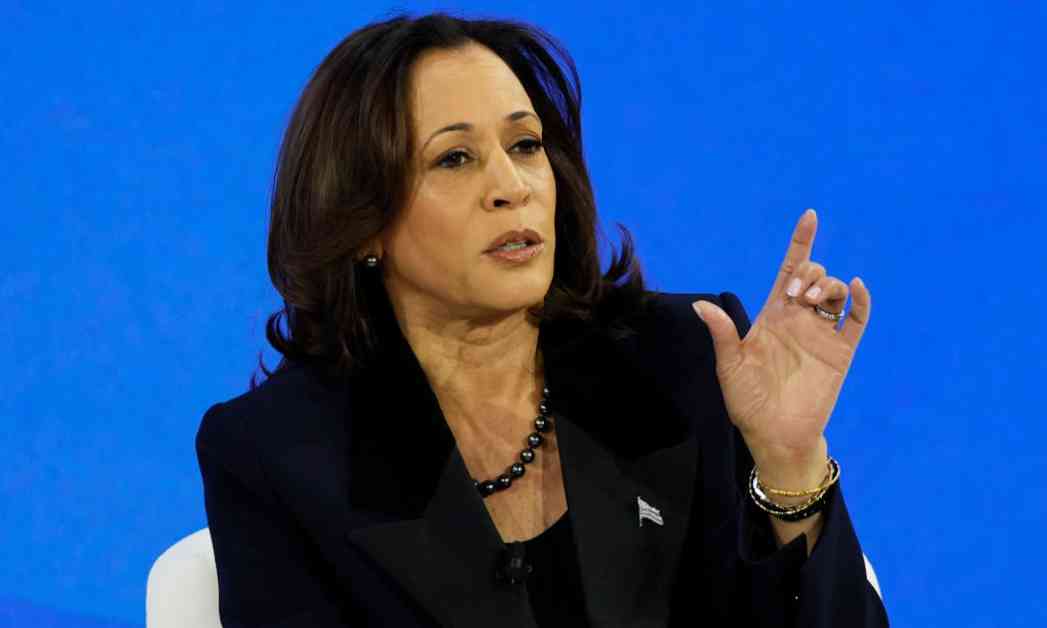Economic Policy Priorities: Addressing High Prices and Easing the Financial Burden on Low-Income Households
As Vice President Kamala Harris prepares to unveil her economic agenda as the Democratic presidential candidate, the focus is on reducing the cost of living and tackling issues of inflation, highlighting the importance of price concerns for voters in this year’s election. Contrasting sharply with President Trump, Harris’s economic platform will emphasize lowering the costs of groceries, housing, and healthcare, as well as enhancing child tax credits.
In a speech in North Carolina, Harris is expected to announce details of her economic policies, with a particular emphasis on reducing the burden on Americans’ wallets. With less than 90 days until the presidential election, Harris’s economic agenda will closely align with President Biden’s economic policies, catering to the middle class and paying attention to policy preferences in swing states.
The Trump administration has been considering new tax cuts for middle-class families, with Harris also proposing tax relief measures for working families. Senator Elizabeth Warren and her colleagues have reintroduced legislation aimed at preventing price gouging and empowering the Federal Trade Commission and states to prohibit unfair price increases.
In addition to consumer prices, Harris is also concerned about the livelihoods of working families, especially those raising children. She is a proponent of the child tax credit, which is expected to alleviate the tax burden on low-income families. Harris will also push for initiatives to reduce the costs of renting and homeownership, including the construction of more affordable housing and climate-resilient communities.
Regarding tax and tariff policies, Harris’s approach will differ significantly from Trump’s, maintaining Biden’s commitment not to increase taxes on individuals with annual incomes of $400,000 or less. While Trump has lowered the corporate tax rate from 35% to 21%, Harris’s focus will remain on supporting working families and middle-class Americans.
Harris’s economic platform emphasizes combating high prices and alleviating the burden on low-income households. In her speech, she pledges to fight inflation, implement tax credits to ease the financial strain on low-income families, and prioritize the well-being of the middle class, stating that “America can only be strong if the middle class is strong.”
Acknowledging the concerns of voters who struggle with housing affordability, expensive prices, and high gasoline costs, Harris’s “Opportunity Economy” vision aims to ensure that everyone has a fair chance to compete and achieve success. She highlights the significant price increases in everyday items, such as bread, and commits to passing the first federal order to prohibit price gouging in American history.
Drawing on her experience as a prosecutor unafraid to hold large corporations accountable, Harris promises to take action against those who do not comply with the rules. She asserts that as president, she will hold wrongdoers accountable and protect consumers from unfair practices.
Harris, who comes from a middle-class background and worked at McDonald’s during college, resonates with voters by emphasizing her commitment to reducing the cost of living and strengthening economic security for Americans. She introduces tax relief measures tailored to the middle class, including earned income tax credits and child tax credits, which provide families with a $6,000 subsidy in the first year of a child’s birth, nearly double that of Biden’s first year in office.
While Vice President Pence also proposed a $5,000 universal child tax credit, Harris’s $6,000 credit is designed for low to middle-income households. She acknowledges the serious housing shortage in America and pledges to build 3 million affordable homes by the end of her first term to address this issue.
Harris’s economic agenda closely mirrors Biden’s economic policies, with a focus on cooling off housing prices. For example, while Biden aimed to build 2 million homes, Harris’s proposal increases the target to 3 million homes. She also supports legislation to prevent investment firms from buying up rental properties in bulk to avoid corporate domination of the rental market and offers a $25,000 down payment subsidy to first-time homebuyers.
Choosing North Carolina as the location for her speech on economic policy signals Harris’s strategic intentions. Historically, the Democratic Party has only won North Carolina twice in the past half-century. According to a poll released on the 14th, Harris leads Trump in North Carolina by a margin of 48% to 47%, highlighting the state’s importance in the upcoming election.
However, many of Harris’s policies will require congressional legislation, so even if she wins the election, the implementation of new policies will depend on whether the Democrats can retain control of the Senate and secure the House of Representatives.
With economic issues taking center stage, Trump is unlikely to sit idly by as Harris launches her economic initiatives. In a speech in North Carolina, Trump criticized Harris for following his lead in canceling the payroll tax policy, but failed to provide detailed specifics on his approach. Trump also held a press conference at his golf club in New Jersey, once again linking Harris and Biden’s economic performance and emphasizing rising prices under the Biden administration.
The ongoing back-and-forth between the two candidates will culminate in a direct confrontation on September 10th during the debate.
In conclusion, Vice President Kamala Harris’s economic agenda focuses on addressing high prices and easing the financial burden on low-income households. With a clear emphasis on reducing the cost of living, combating inflation, and supporting working families, Harris aims to strengthen the middle class and promote economic security for all Americans. As the election approaches, the economic policies put forward by Harris will play a crucial role in shaping the future of the country.












